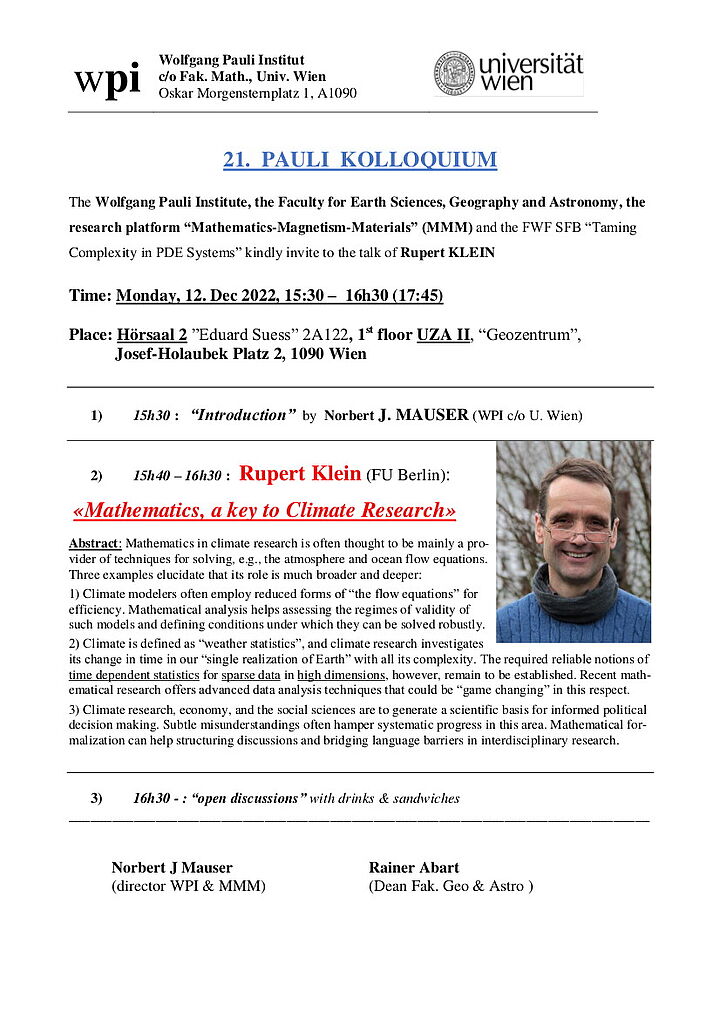Montag, 12. Dezember 2022, 15:30 - 16:30 iCal
"Mathematics, a key to Climate Research"
21. Pauli Colloquium by Prof. Rupert Klein (FU Berlin)
Hörsaal 2 ”Eduard Suess” 2A122, 1 st floor UZA II, “Geozentrum”
Josef-Holaubek Platz 2, 1090 wien
Lecture
1) 15h30 : “Introduction” by Norbert J. MAUSER (WPI c/o U. Wien)
2) 15h40 – 16h30 : Rupert Klein (FU Berlin) :
«Mathematics, a key to Climate Research»
Abstract: Mathematics in climate research is often thought to be mainly a provider of techniques for solving, e.g., the atmosphere and ocean flow equations.
Three examples elucidate that its role is much broader and deeper:
1) Climate modelers often employ reduced forms of “the flow equations” for efficiency. Mathematical analysis helps assessing the regimes of validity of such models and defining conditions under which they can be solved robustly.
2) Climate is defined as “weather statistics”, and climate research investigates its change in time in our “single realization of Earth” with all its complexity. The required reliable notions of time dependent statistics for sparse data in high dimensions, however, remain to be established. Recent mathematical research offers advanced data analysis techniques that could be “game changing” in this respect.
3) Climate research, economy, and the social sciences are to generate a scientific basis for informed political decision making. Subtle misunderstandings often hamper systematic progress in this area. Mathematical formalization can help structuring discussions and bridging language barriers in interdisciplinary research
----------------------------------------------
Short Biography:
Rupert Klein received his doctorate in 1988 in mechanical engineering at RWTH Aachen University and then spent two years as a postdoc with Andrew Majda in Princeton. After his habilitation back in Aachen in 1995 he was professor at the Bergische Universität Wuppertal before accepting a chair in Scientific Computing at Freie Universität Berlin in 1997, with a focus on geophysical fluid dynamics.
From 1997 to 2007 he headed the Data & Computation department at the Potsdam-Institute for Climate Impact Research, where he also served as the deputy director in 2006/07.
In his research he develops and employs techniques of asymptotic analysis and numerics for multiscale dynamics to improve our understanding of a broad range of application problems. Besides the
geophysical fluid dynamics of weather and climate, these include, e.g., the reactive gas dynamics of pressure-gain combustion for gas turbines and electronic structure problems associated with solar energy conversion. His department’s research at the Potsdam Institute led to the mathematical formalization of otherwise rather ambiguous natural language concepts such as “vulnerability” or “resilience”, which are widely used in climate impact studies.
In 2003 he received the Leibniz award, the German equivalent to the Austrian Wittgenstein award, and in 2005 became a member of the Berlin-Brandenburgischen Akademie der Wissenschaften. Other awards Klein received include a 2x3-year fellowship of the European Centre for Medium Range Weather Forecasts (ECMWF), Reading, UK (2014, 2017).
-----
Zur Webseite der Veranstaltung
Veranstalter
Wolfgang Pauli Insititut & Forschungsplattform MMM & Fakultät Geowissenschaften
Kontakt
Univ.Prof. Norbert J. Mauser
WPI c/o Fak. Mathematik
50663
norbert.mauser@univie.ac.at
Erstellt am Montag, 28. November 2022, 15:24
Letzte Änderung am Montag, 05. Dezember 2022, 07:19

